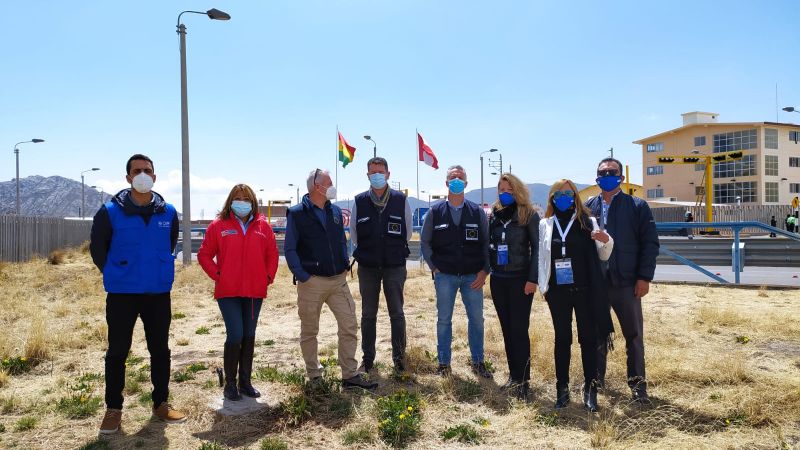News
The EUROFRONT team met regional authorities in Lima, Puno and Desaguadero to lay the foundations for the joint work they will carry out on the Peruvian-Bolivian border. Local migration experts and representatives of the Ministry of the Interior underlined the positive effects that such collaboration should have in terms of border management and the fight against human trafficking and smuggling.

In the words of Silvia Mori, General Director of Democratic Security of the Ministry of the Interior of Peru, this opportunity constitutes “an invitation for each sector and institution, within the scope of their respective competences, to evaluate and seek to take specific actions on the border problem.”
Desaguadero, a border crossing between Peru and Bolivia, is one of the four EUROFRONT pilot borders. As Manuel Rodríguez, an expert from the European programme Support for the fight against Illicit Drug Trafficking and Organised Crime explained, “approximately 50% of the total smuggling that takes place in Peru passes through here.” EUROFRONT’s aim is to contribute to development and security in Latin America by adapting European border management models to the specific needs of each region, in this case Peru, and supporting the fight against human rights violations.
This visit, carried out between 21 September and 24, also coincided with the International Day Against Sexual Exploitation and Trafficking in Persons (23 September), one of the problems derived to a large extent from cross-border crime. During the day, EUROFRONT, through IOM, delivered sensitisation and awareness-raising materials for the fight against human trafficking, translated into Quechua and Aymara.
Silvia Mori identified the lack of control in irregular crossings as one of the factors that promote crimes such as the smuggling of migrants, the potential victims of people trafficking. For the Directorate, ensuring appropriate supervision of transit points into and out of the country is one of the main challenges. This concern was shared by Dr. Jaime Carhuavilca, regional head of Migration in Puno, who feels it is necessary to ensure “more effective regulations regarding irregular migration and the implementation of current technologies that collaborate with the protection of borders.”
To achieve these objectives, the General Directorate of Democratic Security considers the work of EUROFRONT to be significant as a way to “channel support in carrying out assessment and provide information to identify human trafficking in a timely manner and the participation of public servants and officials in relation to the victims. Any study focused on crime hotspots that is carried out through international cooperation will allow the country to make better decisions and implement adequate public policy,” said Mori.
Dr. Jaime Carhuavilca stressed the positive effect that the EUROFRONT programme can have through its focus on Latin America as a whole. He underlined its potential to work on the standardisation of immigration control procedures in Latin American countries, “creating a space for the flow of migrants with regular documentation and respecting the rights of international mobility.”
What was EUROFRONT’s first technical activity in Peru ended on 24 September with the study visit to the Bi-National Border Attention centre at Desaguadero, whose work has been highlighted by José Antonio Cambronero, director of the Component 1 of EUROFRONT and commissioner of the Spanish National Police. The team then visited the pedestrian border control post and the Bolivian goods transport bridge.
The information collected during these four days has made it possible to learn about the work undertaken by Peru on the Desaguadero border and will be completed by the assessment that an expert in European borders will carry out shortly, drawing up a plan for the development of EUROFRONT's strategic lines based on the strengths and weaknesses detected at the border and in conjunction with local authorities over the coming months.
Line of action
Social media news

